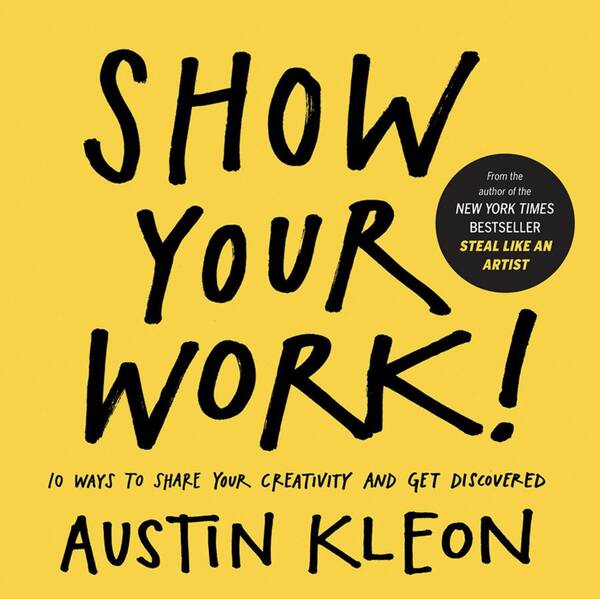🚀 The Book in 3 Sentences
- Share what you love, and the people who love the same things will find you.
- You should be able to explain your work to a kindergartner, a senior citizen, and everybody in between.
- Don't be afraid to be embarrassed, but protect your own vulnerabilities.
🎨 Impressions
It's a book written for insecure artistic people and people who are trying something new. It provides a shove into the right direction, it's motivating. The language is easy and reading it takes no more than a couple hours – it serves its purpose well. Most things he explains are already self-evident and can seem patronizing to read. In other cases, it's nice to read something put into words which you have known intrinsically.
🍀 How the Book Changed Me
- Do things that interest you enough for you to become passionate about them, be an "amateur" (= French: lover). "You can find the time if you look for it."
- In order to be more effective at showing your work, you need to become a better storyteller.
- The book gave me more confidence to share more of what I think and write about. I want to read more of the thoughts of people who I think are interesting, so I might as well start with myself.
✍️ My Top 3 Quotes
- You don't really find an audience for your work; they find you.
- Creativity is a collaboration, the result of a mind connected to other minds.
- "Anyone who isn't embarrassed of who they were last year probably isn't learning enough" (Alain de Botton)
📔 Summary & Notes
- Stop wasting your time networking, start taking advantage of your network. Sharing ideas and knowledge with each other, the parties involved will gain inspiration, ideas, an audience.
1: You Don't Have to be a Genius
- "Lone genius myth": creativity is not an antisocial act performed by only a few great figures. It springs from a scene of people who work together and support each other.
- Online, all people within a scene, the apprentice and the master, can find each other, connect, and contribute.
- Raw enthusiasm is contagious.
- Be an "amateur" (= French: lover) and use whatever tools you can get your hands on to try and get your ideas into the world.
- Current undeniable truth: If your work isn't online, it doesn't exist.
- Steve Jobs: "Remembering that you are going to die is the best way I know to avoid the trap of thinking you have something to lose. You are already naked."
2: Think Process, Not Product
- "People really want to see how the sausage gets made." We are interested in other human beings and what other human beings do.
- Your résumé isn't interesting. People want to see what you made with your own hands so far.
3: Share Something Small Everyday
- A daily dispatch is better than a résumé or portfolio, because it shows what we're working on right now.
- Get into the habit of answering the question "What are you working on?" often. Ask it others.
- "Post as though everyone who can read it has the power to fire you."
- Social media can be used as a public thinking place. We think out loud, let others think back at us, and then think some more.
- Have your own website. Don't think of it as a self-promotion machine, think of it as a self-invention machine.
4: Open Up Your Cabinet of Curiosities
- "You're only as good as your record collection." – Where do you get your inspiration? What sorts of things do you fill your head with? What do you read? Do you subscribe to anything?
- We all love things that other people think are garbage. You have to have the courage to keep loving your garbage.
- Don't try to be hip or cool. Being open and honest about what you like.
5: Tell Good Stories
- Presentation matters: when you show something, people's assessment of it will be deeply affected by what you tell them about it.
- If you want to become more effective at sharing your work, become a better storyteller. You need to know what a good story is and how to tell one.
- Keep your audience in mind. Speak to them directly and in plain language. Value their time.
6: Teach What You Know
- The minute you learn something, turn around and teach it to others. Share your reading list.
7: Don't Turn Into Human Spam
- If you want fans, you have to be a fan first.
- If you want followers, "Have you tried making yourself a more interesting person?" (not meant in a mean way.) Interesting = interested; be curious.
8: Learn to Take a Punch
- Relax, no one has ever died from a bad review.
- Protect your vulnerable areas, but remember: "Compulsive avoidance of embarrassment is a form of suicide."
- Remember your work is something you do, not who you are.
- The troll in your head needs to be silenced.
9: Sell Out
- Don't be one of those horrible fans who stops listening to your favorite band just because they have had a hit single.
- Don't be afraid to charge for your work, but put a price on it that you think is fair.
- People who holler "Sellout!" are the ones who don't want things to ever change.
10: Stick Around
- This way you're going to get what you want.
- Ernest Hemingway would stop in the middle of a sentence at the end of his day's work so he knew where to start in the morning.
- Take a sabbatical to recharge, every 7 years. Taking one can take two years of planning and budgeting, and warning your clients a full year in advance.

Leave a Comment